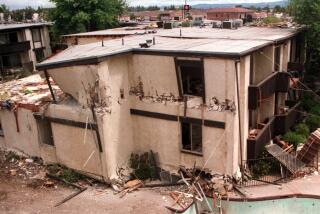His courage knows no darkness
- Share via
He was a soldier in Iraq and he’s a soldier now, shoulders squared and head held high on a street corner in Santa Fe Springs at 6:30 a.m., waiting for a bus with his guide dog, Charley.
Sgt. Maj. Jesse Acosta’s hat says “Army.” His green jacket says “Military Order Purple Heart. Combat Wounded.” Dark shades conceal his prosthetic eyes.
Better to fight the enemy on distant shores, the argument goes, than fight the enemy here. But that doesn’t mean the war doesn’t eventually come home. For Acosta, a 50-year-old gas company employee with a wife, four children and three grandchildren, what happened in Iraq will permanently complicate his life.
“OK, we’re going to take the 62 to the 108,” says Felicia Echeverria, an orientation and mobility trainer with Junior Blind of America who is teaching Acosta how to travel by bus.
Echeverria has been working with Acosta since February, helping him adapt to 24-hour darkness.
“He’s amazing,” she says, telling me she hasn’t had many students with his courage and determination. He has already graduated from white cane to German shepherd, and now he’s making his first attempt to ride a bus with his new dog and report for computer and GPS training at Junior Blind headquarters in the Southwest Los Angeles area.
“Forward,” Acosta commands when the bus door opens.
Charley sets a paw on the first step of the bus. Acosta, with a firm grip on the dog’s harness, dangles a foot off the curb and searches the empty space between sidewalk and bus.
The move is daunting. It’s a short step, but it’s also a leap of faith, with invisible geometry to negotiate. Acosta is balanced on one foot, dog tugging, passengers waiting and watching.
With Charley’s help, Acosta finds his way. He’s up the stairs and telling the bus driver to please announce his transfer stop when they get to it. He asks her if there’s an open seat on the left or the right, and looking in her rear-view mirror, she gets it wrong. Acosta is about to sit in someone’s lap when the passenger tells him the open seat is on his right, not his left.
He sits down, relieved, pulls Charley back out of the aisle and takes a breath. Everyone on the bus is watching. When you’re blind, Echeverria says, you lose your privacy.
The driver forgets to tell Acosta his stop is next, so Echeverria fills the gap.
“I guess I better get used to this,” he says without a trace of self-pity. This is a man who lifts weights every morning in the backyard and still has a military bearing and sense of purpose.
The transfer is clean. Acosta doesn’t trip or bump into any poles, as he’s done more than once. He has to get this down cold, he says, because early next year he’ll go back to work with the Southern California Gas Co., traveling by bus to Downey. His days of house calls as a customer service rep are done, but the company has told him it will find something else for him.
Bumping along on Slauson, I ask Acosta why he did it. Why, in 2002, did he re-enlist in the Army Reserve, as he had done previously after seven years of active duty following high school? Was it Sept. 11?
“No, not really. I’m a warrior, and I still had a lot left in me.”
The call to duty came in the spring of 2005, with deployment to Iraq in late October. His wife, Connie, had trouble with it, proud of her husband but tired of sharing him with the Army. He told her it was a safe assignment -- a logistics and supply operation at Camp Anaconda along the Euphrates River near Balad, Iraq.
“Little did I know they called Anaconda ‘Mortaritaville,’ ” Acosta says.
--
The mortars flew into the base every day. Then a first sergeant, he commanded 43 soldiers and routinely ordered them to dive for cover. He was doing just that Jan. 16, 2006, when he was hit. A shard of shrapnel ripped through his left eye, destroyed the nerve that controls taste and smell, nicked his brain, then took out his right eye.
“They say I was crawling around on the ground, shouting orders,” says Acosta, who remembers nothing. Only later did he learn that surgeons spent more than seven hours trying to save him. Then he was flown to Germany for more treatment.
“I got a call from the doctor in Germany,” Connie says. “He said, ‘You know, I tried to get him to where he would ever see light again.’ He cried with me -- the doctor. He said, ‘I’m sorry, but he’ll never be able to see again.’ ”
Several surgeries followed, with more to come. Acosta’s palate and several teeth were blown out of his head, and doctors have taken bone from his hip to rebuild the palate. When he eats a hamburger, he puts familiar textures together with memories of what cheese and mustard tasted like. “I try to savor it,” he says.
“I hope it was worth it, Mr. Bush,” says Echeverria, who has a tear in her eye.
But Acosta doesn’t engage. He says he believed in the cause when he re-enlisted, and even now, traveling across the city in eternal darkness -- and weighted, perhaps, with a touch of guilt for the sacrifice his wife and family must make -- he doesn’t question his service.
What he does question, his voice taking on an edge, is the quality of care he received after coming home. Walter Reed Army Medical Center released him too soon, he said, and he was sent to a Palo Alto rehab center for the blind while still reeling from the brain injury.
“I received no care whatsoever coming back to the U.S.,” he says, exaggerating only a little as he describes it. “You come back from the battlefield, you can’t eat, and if not for older vets saying, ‘Hey, kid, you’ve got a plate of food in front of you,’ I wouldn’t have known it.”
He was so depressed, he began wishing the surgeons hadn’t saved him. That piece of shrapnel could have hit almost anywhere else on his body and caused less damage. How could it have been so perfectly angled to take both eyes and prevent him from ever seeing his wife and children again?
“Every day I had massive headaches from my injuries, and I didn’t even have access to staff. Nothing. If you needed them before 8 a.m. or after 4 p.m., forget it, they were gone. They expected me to get on with my life.
“Who sent me here from Walter Reed like that? I had to seek my own medical care, believe it or not. I told them I was leaving Palo Alto and they said, ‘You can’t do that.’ I said, ‘Watch me.’ ”
Acosta says his new mission is to advocate for injured vets.
“I’ve learned enough about the system to help them figure things out,” he says, and he’s already begun networking, using VA sources and other contacts.
They shouldn’t have to figure it out, I tell him. He made the sacrifice, and the care should be there, period.
“I know,” he says. But with Charley at his feet, and with some passengers listening in, I can tell he’s done with that subject.
He does credit the West Los Angeles VA with referring him to the nonprofit Junior Blind ( www.juniorblind.org), where, for the first time, he believed he could rebuild his life. He was inspired by such staffers as Bert Borja and Les Subotnick, both blind, who are showing him how to read books and write letters with voice-assisted software.
A director named Ken Metz, blind since birth, is already taking Acosta around to serve as a motivational speaker to other visually impaired people.
--
It’s almost 9 a.m. when the 108 stops at Alviso Avenue. Sgt. Maj. Acosta and his dog Charley get off the bus, cross the intersection and turn north for a two-block walk. They’re getting the rhythm down, marching at a good clip now, with Echeverria marveling at Acosta’s discipline and determination.
Last March, he ran the Los Angeles Marathon with his 14-year-old daughter, Brittany. She was the one most devastated by his injury, and he wanted to prove to her that he still has a lot left in him.
“I don’t want anyone to do anything for me,” Acosta had told me on the bus when I asked why he doesn’t ask his wife to drive him to these training sessions. “If I have to bounce off every pole and fall off every curb, that’s what I’ll do.”
--
More to Read
Sign up for Essential California
The most important California stories and recommendations in your inbox every morning.
You may occasionally receive promotional content from the Los Angeles Times.














